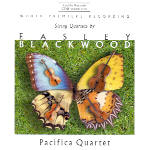The first two string quartets by Chicago-based composer Easley Blackwood (born 1932) typify the atonal yet formally conservative style he cultivated in his 20s. Following a brief Largo introduction, the opening movement of his First quartet bristles with energetic counterpoint, colored with chordal punctuations that refuse to settle into any particular groove. The Andante con moto suggests Shostakovich in the Russian composer’s twisted nursery rhyme mode, but with bleaker, thicker harmonic motion. The quartet concludes with a rigorous, whirling rondo. Quartet No. 2 is generally a more lyrical work–uncompromising stylistically, to be sure, but rich in dramatic and melodic contrast. Beginning in 1980, Blackwood abruptly shifted his compositional style toward late-19th-century tonality, as exemplified by his 1998 Third quartet. In his program notes Blackwood likens its harmonic syntax to Verdi, Ravel, and Franck. I’m not sure I agree; Blackwood’s modulatory patterns are molded toward more austere, less overtly sensual ends. Moreover, there’s a sense of freedom and structural pliability here that allows Blackwood’s own voice to emerge with more expression and clarity than in his earlier quartets. The Pacifica Quartet, for whom No. 3 was written, must have rehearsed these works with loving care. The wonderful performances are captured in sumptuous sound that embraces rather than overwhelms the listener. A truly distinguished release in every way.
































